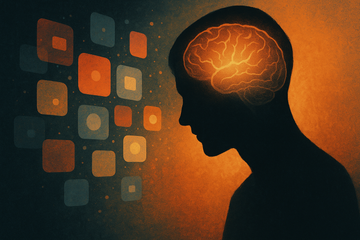We live in a time where overstimulation is the baseline. Constant notifications, endless scrolling, loud headlines, flashing ads — all pulling at our attention. And even though we know it leaves us drained, anxious, and distracted, we keep going back for more. The truth is, your brain has been wired to crave what actually hurts it. Understanding why is the first step toward reclaiming control.
Why Overstimulation Feels So Addictive
Your brain is built to seek novelty. Every new sound, headline, or scroll of the feed gives you a small dopamine hit. That hit doesn’t feel harmful in the moment — it feels like energy, like reward, like life is moving. But this “reward system” wasn’t designed for endless streams of artificial stimulation.
Instead of satisfaction, you get restlessness. Instead of clarity, you get noise. It feels like relief in the moment, but leaves you emptier after. This cycle is addictive because:
-
Novelty creates dopamine. Your brain lights up with each new thing.
-
The system adapts. What once excited you quickly feels flat, so you need more.
-
Withdrawal feels heavy. Silence, stillness, and boredom feel uncomfortable when your brain is used to constant stimulation.
This is how the trap is set: you’re left craving the very thing that exhausts you.
The Hidden Cost of Constant Input
Overstimulation doesn’t just steal your attention; it reshapes your mind. When you live in constant input, your brain loses its ability to rest, focus, and process deeply.
-
Your focus fractures. You struggle to hold one thought or task.
-
Your nervous system stays tense. Always “on,” always waiting for the next ping.
-
Your inner voice gets drowned out. You can’t hear your own thoughts over the noise.
And the cost isn’t just mental. It shows up in your relationships, your sleep, your health, and your sense of self. You start to feel like a passenger in your own life instead of the one steering it.
Why Your Brain Craves What Drains You
This paradox — craving what harms you — isn’t a flaw. It’s survival wiring being hijacked by modern design. Platforms, ads, and media are built to capture attention, not to protect your mind.
-
Dopamine doesn’t equal happiness. It equals anticipation. That’s why scrolling rarely satisfies.
-
Your brain mistakes stimulation for progress. It feels like movement, even when nothing is changing.
-
Stillness feels wrong. Silence can feel threatening because your brain has been trained to expect constant noise.
Recognizing this pattern doesn’t make you weak — it makes you human. It means you’ve been caught in a system designed to keep you hooked.
How to Break the Cycle Without Burning Out
You can’t simply swear off stimulation. The world is noisy, and technology isn’t going away. The goal isn’t to escape life — it’s to reclaim balance.
Start with simple, human steps:
-
Create pockets of silence. A few minutes a day without screens rewires your tolerance for stillness.
-
Protect your inputs. Be intentional about what voices, media, and people you allow in.
-
Practice single-tasking. Even washing dishes without distraction builds focus back.
-
Let boredom return. It’s not a curse — it’s space where creativity and clarity grow.
The goal is not a perfect, distraction-free life. The goal is learning to live above the noise rather than drowning in it.
FAQ: Honest Questions About Overstimulation
Is it possible to “detox” completely?
Not in the modern world. But you can reset your baseline so that silence and stillness stop feeling unbearable.
Why does silence feel so uncomfortable at first?
Because your brain has been trained to expect constant input. That discomfort is a sign of withdrawal — and a sign that your brain is healing.
How long does it take to notice change?
Even a week of intentional silence pockets can shift your tolerance. But like fitness, it’s about consistency, not perfection.
A Closing Thought from Benevolentia
The truth is simple: your brain will crave what hurts it until you teach it something better. Overstimulation will always be offered to you. But the quiet path — the harder path — is where you find yourself again. Clarity doesn’t come from more noise. It comes from learning to live without it.
- Benevolentia ✨






